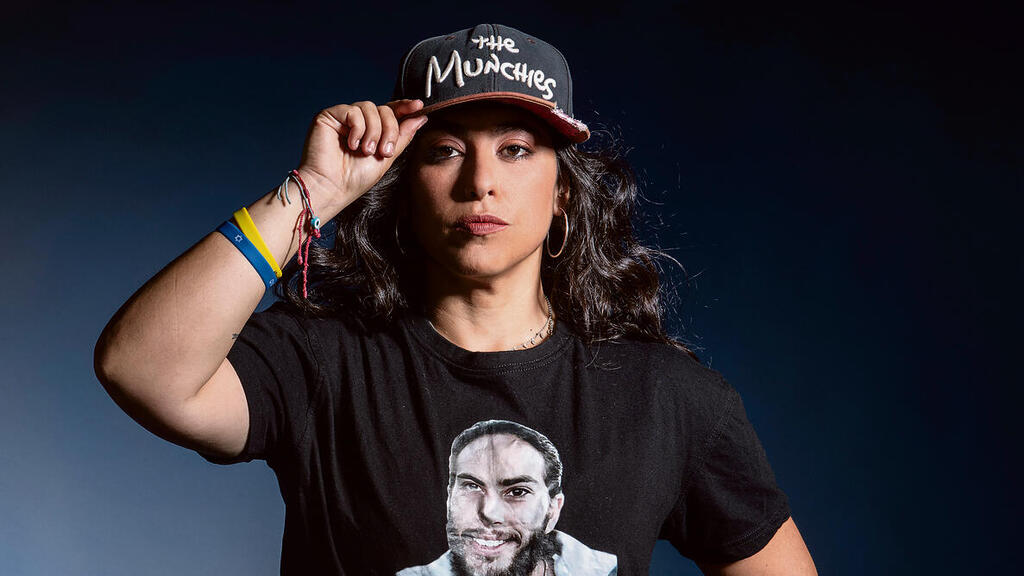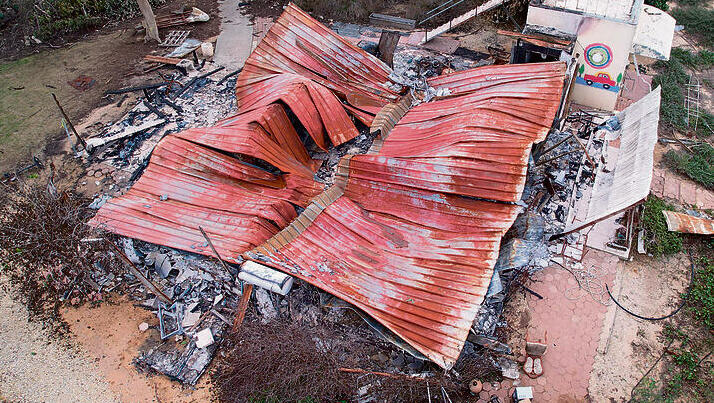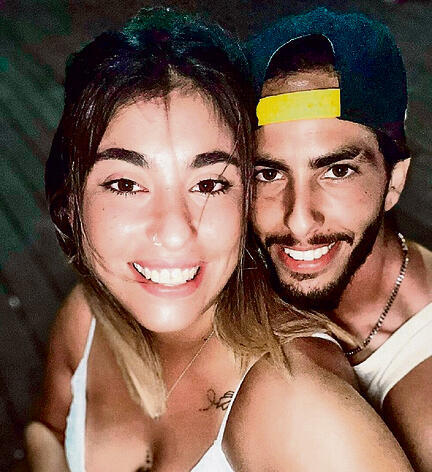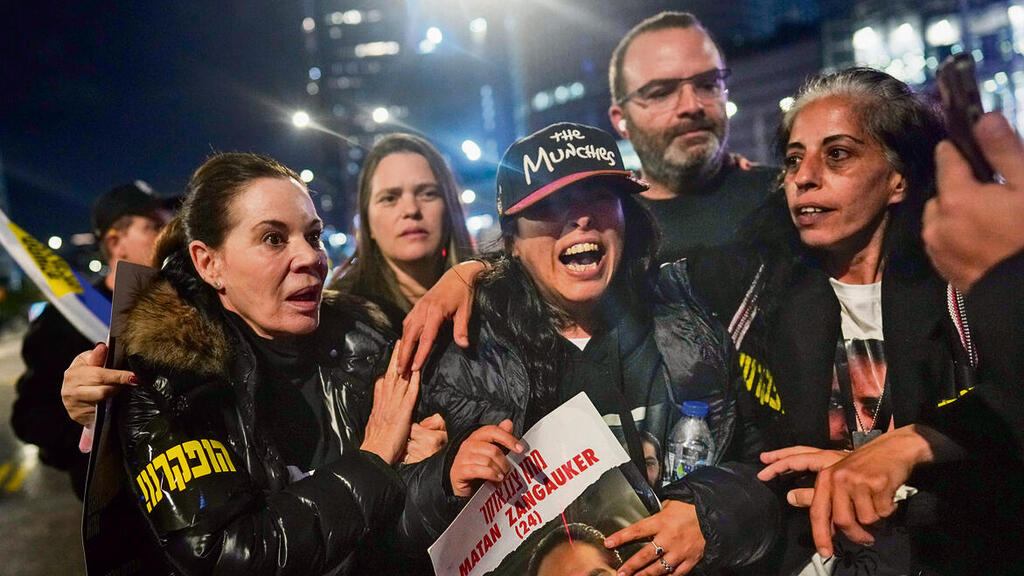Getting your Trinity Audio player ready...
The scene from the Begin Bridge last Saturday evening was sadder than ever. Usually, there's a faint hope during these hours, when citizens crowd the roads surrounding the IDF’s headquarters in Tel Aviv, calling for a hostage deal.
This time, under the shadow of threats from Iran and Hezbollah, the protests were scaled down. The number of demonstrators who came to support the hostages’ families significantly decreased. One of them is Ilana Gritzewsky. She wears a shirt with a picture of her partner, Matan Zangauker, on it, a hat he used to wear on her head, and a necklace with a picture of the two of them.
Every so often, someone arrives, puts a hand on her shoulder, offering a hug or kind words. One protester comforts her and says something about the wedding they will still have when he returns. This is the most common wish of Israelis who meet her: a wedding that will symbolize the happy ending for the couple who, on October 7, didn’t even have time to say goodbye before they were kidnapped, each separately, from their home in Kibbutz Nir Oz.
Ilana knows the intentions are good, but her wishes are far more modest. "First, let him come back," she says quietly, in a South American accent, and when I ask her about the timing of the protest that kept many at home. "I'm not afraid of Nasrallah, nor of a war with Iran. The only thing that scares me is that a deal won’t come through."
A young woman who was kidnapped from her home in her pajamas and returned to Israel after 55 days in hell stands on a bridge in central Israel so that people would listen to her. So that they won’t forget her beloved partner who was left behind. Now, she speaks for the first time.
'I think they wanted to kill me'
"I need a hearing aid now," she says. "During the abduction, there was a grenade explosion, Kalashnikov shots near my ear, blows to my head. It worsened in captivity, with the shelling I heard from the place where I was held. You hear everything and feel the shockwaves.”
“I also have injuries to my pelvis and hip, I'm doing physiotherapy. Every morning, I look at the mark on my leg from the burn from the motorcycle exhaust I was kidnapped on. They marked me. But the worst thing about it is opening my eyes and seeing my partner on the pillow. I have a pillow with his picture. I sleep with that pillow if I manage to sleep at all."
Did you believe you would survive?
"I think they wanted to kill me because they threw me against a wall, then pointed all their weapons at me, wanted to get a phone to film it – then someone pulled me onto a motorcycle. I thought they’d kill me, that they’d rape me. We rode around the kibbutz on the motorcycle, I heard screams, saw people stealing, burnt homes, Hamas terrorists fooling around with forklifts, playing ‘bumper cars’ with kibbutz vehicles.
“You don’t really believe what your eyes are seeing because suddenly all of Gaza is inside your home. They were roaming freely, Hamas terrorists coming, going, back and forth. I understood Nir Oz was abandoned, that no one was coming. At some point, I lost consciousness on the motorcycle. From the shock, the blows, maybe because my body would rather lose consciousness rather than be there if they decided to rape me."
"I woke up already inside Gaza, with someone spraying perfume in my nose and slapping my face. I opened my eyes, and there were about 20 Gazans around me. They took off all my bracelets, stole everything from me, and someone said, 'Welcome to Gaza.' Then they lifted me by my hair, gave me a disguise, and loaded me into a vehicle with armed men.
“They took me to some house. I was in a room full of guns, grenades, computers and commanders. A woman alone among all these men. At some point, I had to think about who to ask for a pad because I was on my period,” she described.
“We didn’t have a moment to get our bearings, brush our teeth, or wash our faces. I was wearing pajamas underneath, with a hijab and skirt over them, a burn on my leg and a bleeding face while on my period, not knowing what happened to Matan, with 20 men in the room. I started vomiting from the stress.
"In the evening, they moved me to another house with about seven men. One of them just latched onto me, started taking my jewelry, and said, 'You're going to marry me. From here, we're going to have children. You're staying here with me. You're already mine.'
“And I was crying and vomiting. When night came, I was left with the two who would be guarding me during my captivity. The next day, they brought another woman from Nir Oz, Liat Atzili. I spent most of my time in captivity with her."
'I would do anything to get him free'
And you knew nothing about Matan.
"Nothing at all. I thought he looked Arab and knew a bit of Arabic, and I told myself he must have disguised himself as one of them and managed to escape. But after two weeks, I had a dream where my mom said to me, 'Ilana, look who’s here,' and I turned around and saw Matan.
“I asked him, 'Sweetheart, what are you doing here?' And he replied, 'I came to be with you, I’m with you.' When I woke up, I had a feeling he came to tell me he was also in Gaza. Something told me he was alive but that he was suffering just like me."
What do you remember about your release?
"The day when I was released felt like an eternity. The day before that I was moved to a tunnel, and there I found out Matan was in the same tunnel."
How did you react to that?
"I wanted to break the entire tunnel. I cried and begged them to let me see him. But they didn't allow it. I didn’t want to be released until they let me see him, but I realized I had no say in the matter.
“So, I asked the other hostages I met to pass on a message to him: that I would do everything to get him free. I also asked the Hamas terrorists to tell Matan that I would do anything for him. Everything."






